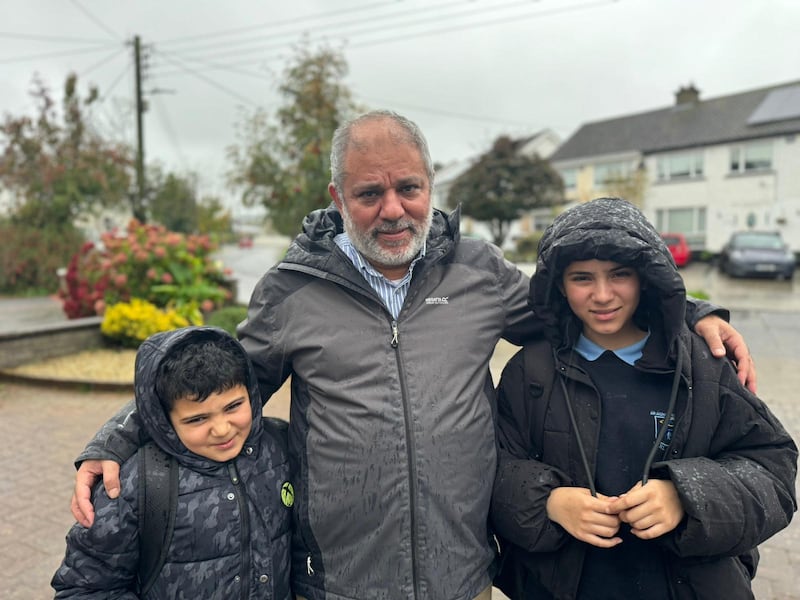A Palestinian family in Dublin has pleaded with the Irish government to help their daughter escape the Israeli occupation in Gaza.
Saja Samour (27) is currently in the centre of the Gaza strip in Deir al-Balah, but last month was denied a visa to travel to Ireland.
Her parents Akram (55) and Hanan (46) now have sleepless nights waiting for their daughter to get enough phone signal to let them know she is safe.
They moved to Dublin in 2021 with their other children Ismail (22), Mohammad (20), Aberrahman (16), daughter Razan (12) and son Ibrahim (10).
- Israeli troops withdraw from Gaza’s main hospital after two-week raidOpens in new window
- Ireland is to intervene in South Africa’s genocide case against IsraelOpens in new window
- ‘I think the US can stop this war in one minute’ - Belfast-born Khalid calls for Stormont leaders to make the case for Gaza ceasefireOpens in new window
Mohammad is already an Irish citizen, born in Belfast when his father was studying for a PhD.
The rest of the family in Ireland have residency and are eligible to apply for Irish citizenship.
With increased international attention on the humanitarian crisis that followed the October 7 Hamas attacks, Saja was not among those prioritised for departure from Gaza such as foreign and dual nationals or their dependents.
In October, the Irish government had also stated that Palestinians would not be eligible for a fast-tracked Temporary Protection system granted for Ukrainian refugees.
“My daughter has been evacuated around four times. In the beginning she was in the north of Gaza,” Mr Samour said.
“She only took a few belongings and left everything. The building she was renting and living in was later destroyed completely.”

With a business degree, Saja is working remotely for a Saudi company and has been guaranteed that she can keep her job if she moves to Ireland.
“She later moved to a beach camp before coming to Deir-al Balah where it’s a very miserable and terrible situation, where there’s lack of food and water for drinking or even washing.
“The killing is everywhere, bombing is everywhere. There is no secure place for anybody.
“She said to me once during Ramadan, ‘dad, they have got for every family only two eggs’.
“So the situation is very bad. Sometimes she contacts us and sometimes there is no internet or power to charge her mobile.
“Some nights we can’t sleep thinking about her. Her mum cries and begs me to do anything I can to bring Saja here.”
Mr Samour has written to Irish government ministers and 60 TDs to try and get support.
“Everyone here had hope we could bring Saja here, but we were all disappointed by the decision (not to grant a visa) on March 18.”
He said a better life for his family was the motivation to move his family to Ireland in 2021 - seeking freedom, justice, better services and future education and economic prospects.
“My sons and daughter are now in a better situation. Ismail and Mohammed are both working and studying.
“The others are in school and doing well.”
Praising the Irish government’s recent decision to intervene in South Africa’s genocide case against Israel, Mr Samour said he had less faith in countries like the United States, UK, Germany and France to push for a ceasefire.
“I don’t think they can put pressure on the situation because, from my point of view, they are partners with Israel,” he said.
“They send weapons and other resources to Israel to kill Palestinians.”
Addressing the Irish government directly, he said: ”I’m proud of the people here, the Irish people when they hold their demonstrations in Dublin.
“Many people go out with their children even if it is windy and rainy. So my expectation is for the government to be in parallel with this when it comes to Saja’s case and for other humanitarian cases.
“We want them to bring Saja here quickly.”
A spokesperson for the Irish Department of Justice said they could not comment on individual cases, but added: “The department is acutely aware of the grave humanitarian crisis and is working closely with colleagues in the Department of Foreign Affairs to ensure a coordinated national response to this volatile and evolving situation.”








